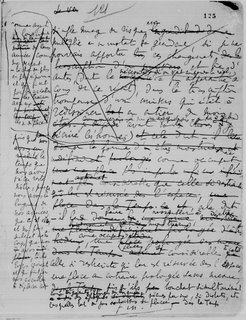One of the most moving passages in Ralph Ellison's Invisible Man (1952) is the narrator's careful inventory of the items being put into the street as an old couple are evicted from their Harlem apartment. Here's a sample:
Pots and pots of green plants were lined in the dirty snow, certain to die of the cold; ivy, canna, a tomato plant. And in a basket I saw a straightening comb, switches of false hair, a curling iron, a card with silvery letters against a background of dark red velvet, reading "God Bless Our Home"; and scattered across the top of a chiffonier were nuggets of High John the Conqueror, the lucky stone; and as I watched the white men put down a basket in which I saw a whiskey bottle filled with rock candy and camphor, a small Ethiopian flag, a faded tintype of Abraham Lincoln, and the smiling image of a Hollywood star torn from a magazine. And on a pillow several badly cracked pieces of delicate china, a commemorative plate celebrating the St. Louis World's Fair . . . I stood in a kind of daze, looking at an old folded lace fan studded with jet and mother-of-pearl.Thinking about this passage made me remember the invitation I've scanned here, which I bought for fifty cents at a flea market a few years ago.
 Who might have saved this card for so many years?
Who might have saved this card for so many years?A husband and wife who met at this dance?
Their children?
A. Pellegrino?
One of the Syncopators?
A printer (note that it's a union printer) who liked to hold on to copies of his work?
One of the barbers?
Someone who liked the lyrics on the back?
I thought it appropriate to give this invitation a home.
The Lawndale Masonic Temple, I learned tonight, was located at 2300 Millard Avenue in Chicago. The webpage for the Chicago Public Library's Lawndale-Crawford Community Collection describes the neighborhood:
By 1900, Bohemian immigration into the Lawndale-Crawford area replaced the earlier settlers of Dutch, German, Irish, and Scotch extraction. Within a few years, the community was considered the largest Bohemian settlement, outside of Prague, Czechoslovakia. This ethnic group was very politically and socially active throughout the 1920s, 1930s, and 1940s, which resulted in the formation of numerous civic and social organizations as well as a close-knit community.Google Maps shows a large building still standing at 2300 Millard Avenue. It seems to now be home to one or two churches: New Life Christian Church and/or La Villita Community Church.
As the area continued to develop, the population shifted, and the Bohemians began to move further west and northwest. They were replaced by various other ethnic groups such as the Poles, and finally the Hispanics, who still reside in the area today.
The songs: "In a Little Spanish Town," music by Mabel Wayne, lyrics by Sam M. Lewis and Joe Young, appeared in 1926. "Thinking of You," music by Harry Ruby, lyrics by Bert Kalmar, was featured in the 1927 show The Five O'Clock Girl. ("'FIVE O'CLOCK GIRL' IS HIGHLY ENJOYABLE" said the New York Times on October 11, 1927. "Thinking of You" isn't mentioned in the review.) Were people dancing to one or both songs on January 15, 1927?
And about the barbers: The only Chicago "F. Carbone" listed in the Social Security Death Index is Frank Carbone (1910-1980), too young to be the man on the card. I wonder if "E. Popp" might be Edward (1879-1965), Ernest (1902-1971), or Edwin (1906-1973) (the last almost certainly too young).
The address where Messrs. Carbone and Popp had their shop seems to no longer exist.
Update, February 2012: Here is a 1925 photograph of Anthony Pellegrino and the Alabama Syncopators.
Lawndale-Crawford Community Collection (Chicago Public Library)
High John the Conqueror (Lucky Mojo Curio Company)
Found (On another bit of ephemera)






